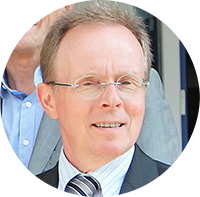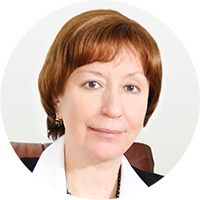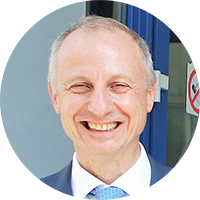First Graduates Complete Double-degree Master’s Programme in Big Data Systems and Information Systems Management
On June 27, 2016, the first graduation ceremony for the double-degree Master’s programme in Big Data Systems and Information Systems Management was held at the Higher School of Economics in Moscow. The ceremony marks three years of successful collaboration between HSE and University of Applied Sciences Technikum Wien, which run the Big Data Systems and Information Systems Management components of the programme, respectively. Ten graduates (six from Austria and four from Russia) were awarded double-degree diplomas after having spent time studying in both Russia and Austria, as well as presenting their Master’s theses to a joint examination committee. Andrea Bacher, the second secretary of the Embassy of Austria in Russia was present at the event.

Fritz Schmöllebeck, Rector of the University of Applied Sciences Technikum Wien, shared his thoughts about how the collaboration with HSE has gone so far and his views on its future potential:
— The joint programme between HSE and UAS Technikum Wien has become one of those multi-national bridges that develop and promote technology across the globe. What is your vision of the programme and its future development?
—The joint programme is based on a fruitful collaboration that aims to further increase mobility, teaching and research between both institutions. Joint projects in fields like Big Data contribute to future cooperation, strengthening the quality of institutions and drawing sustainable benefit for students, staff and academics.
— How did these six Austrian students come to HSE Moscow? What was the admissions process like?
— Austrian students had to pass a well-defined selection procedure at UAS Technikum Wien that was developed and agreed upon with our partners at HSE’s School of Business Informatics in Moscow. The admissions process at HSE was easy going. Students were offered support in all matters such as visa applications, locating apartments at dormitories, helping with scholarships, etc.
— Do young people need to be real geeks now to make a breakthrough in modern technology? How do you see modern students in Vienna and Moscow?
— Young people don’t have to be real geeks, but they should have a strong interest in technology. They should be eager to know about the functionality of technology and have fun when looking ‘under the hood’.
Our students’ lives and working conditions are changing rapidly. This is one of the most demanding situations for modern universities. We have to offer more flexibility and support to our students from year to year, so that is why we strive to stay connected to their lives.
— What is essential in order for technology to help to build a better and more advanced world? How do you see the role of universities in this process?
— Technology should primarily help make our lives easier. In recent years, technology has had a huge impact on communication. It’s getting very easy to communicate through diverse media. If we use technology in building bridges to other people, other cultures, and other countries, it could become the key to a world with more mutual understanding and mutual trust.
Universities have to see that technology is not insulated. We should give our students opportunities to look at technology in various contexts. In most cases, technology is neutral in some respect. When we apply it in a certain situation we have to think carefully about the benefits and drawbacks.
— What feedback did you receive from your students while in Moscow? Did they contribute anything about their experience to your website or social media?
— The students gave very positive feedback. On the one hand, they were thankful for this extremely valuable experience to study at HSE. On the other hand, they were excited to increase their knowledge of social, linguistic and cultural matters here in Moscow. At UAS Technikum Wien we are currently working on the launch of our new redesigned website; there we will definitely report about students’ experience at HSE Moscow.
— It is a real privilege to have you at the ceremony in Moscow. What is next on our cooperation agenda?
— It is a privilege for me to be invited to this ceremony in Moscow! I would be very happy if we could extend our cooperation to the field of advanced technologies in industry and digital factories. Doing research projects together on the boundary between economics and technology is also an interesting field for new activities. But we should also work hard on our already established cooperation by learning from students’ feedback and the feedback from our industry partners.
Svetlana Maltseva, Academic Supervisor of the Master’s programme in Big Data Systems at the HSE School of Business Informatics, and Helmut Gollner, Programme Director of Business Informatics and Information Systems Management at UAS Technikum Wien, also commented on the current status of the two universities’ collaboration:

Svetlana Maltseva:
‘I am very happy about the collaboration with UAS Technikum Wien and am satisfied with our initial results. The collaboration has made the content of the programme and learning process more interesting, and has provided students additional opportunities to explore the theoretical and applied aspects of Big Data’.

Helmut Gollner:
‘I am very satisfied with the results of this double-degree programme. Austrian students gained a lot from their studies of Big Data at HSE, both inside and outside of the university. They are well prepared for the labour market and their future carriers’.
About the University of Applied Sciences Technikum Wien:
With around 9,000 graduates thus far and roughly 4,000 students, the University of Applied Sciences Technikum Wien is Austria’s largest purely technical university of applied sciences. The institution places great emphasis on combining extensive technical content with subjects focusing on business and personal development. In addition, collaborations with partners around the world broaden the international scope of students and staff.
See also:
‘These Are Very Promising Specialists in Product Management and Data Analysis’
HSE University launched the Master’s in Data-Driven Communication in 2019. The programme is aimed at promising managers who want to master modern technologies for working with clients. It trains professionals in product management and marketing who know how to work with data and AI.
Faculty of Computer Science Lab Develops Monitoring System for LHC Experiment
Researchers from the Laboratory of Methods for Big Data Analysis (LAMBDA) at the HSEFaculty of Computer Science have created a monitoring system that is used in the Large Hadron Collider beauty experiment (LHCb). The system helps track the quality of the collected data and allows operators to quickly find errors.
Economic Empowerment at HSE University
HSE University alumna Dr. Elena Podkolzina recently became an academic supervisor of the newly established master's programme in Economics and Economic Policy. Having been part of HSE University for nearly 25 years now, Dr. Podkolzina recalls her student years and shares her experience as deputy director of the Center for Institutional Studies.
‘We Facilitate High-Speed Car Crashes and Study How Car Engines Work Based on Photos of Flying Debris’
Nikita Kazeev holds a Candidate of Sciences degree (Russian equivalent of a PhD) in Computer Science and a PhD in Physics. He is a Research Fellow at the LAMBDA Laboratory and works at CERN. In an interview with HSE News Service, he talked about what it was like to defend his dissertation in a double doctoral degree programme at HSE University and Sapienza University of Rome, what it is like to conduct research in Geneva, and why it is imperative to communicate with colleagues.
‘Completing My Studies in Russia Has Always Been My Dream’
Ismail Kayali, from Aleppo, Syria, earned his MS in Big Data Systems from the HSE Faculty of Business and Management in 2018. He is currently pursuing a PhD in Informatics and Computer Engineering at the HSE School of Data Analysis and Artificial Intelligence.
‘My Time at HSE Will Always Be Special for Me’
Sangam Kumar Singh is currently finishing the second year of his Master of Science in Big Data Systems. After spending the first year at HSE Moscow, he has gone to the UK on a double degree track with Lancaster University. Sangam has talked to HSE News Service about his studies, hobbies, research interests, and future plans.
Social Media as a Lens on Collective Emotion
During the XX April International Academic Conference on Economic and Social Development, scheduled this year for April 9-12 at the Higher School of Economics, Dr David Garcia of the Complexity Science Hub Vienna and the Medical University of Vienna, Austria will present a report entitled ‘The digital traces of collective emotion’ at a session on ‘The Wellbeing of Children and Youth in the Digital Age.’ Ahead of the conference, Dr Garcia spoke with the HSE News Service about his conference presentation, his research, and plans for ongoing collaboration with HSE colleagues.
‘Big Data Systems Programme Is the Perfect Amalgam of Business, Analytics, and Informatics’
Sangam Kumar Singh has come from India to do a Master’s in Big Data Systems at the HSE School of Business Informatics in Moscow. He has chosen HSE due to its high standing in global university rankings such as QS and the Times Higher Education ranking as well as its focus on research and innovation. Having started his career in engineering within telecommunication business and later moving onto R&D application and analytics in the same area, he was drawn to HSE’s programme because it combines business, informatics and analytics and equips its graduates with the skills and knowledge required by our modern economy and ever-changing market dynamics.
Graduation Ceremony for the Double-degree Master’s Programme in Big Data Systems
On June 29, the third graduation ceremony for the double-degree Master’s programme in Big Data Systems (HSE, Russia) and Information Systems Management (UAS Technikum Wien, Austria) was hosted at the Austrian Ambassador’s Residence in Moscow. Dr. Hartmut Koller-Lenhardt, Chancellor at the Embassy of Austria in Moscow, gave the opening address. He congratulated the graduates on their successful completion of the programme and stressed the importance of cooperation between the universities in regards to cultural and professional communication and connections.
Leading Researcher at the HSE Faculty of Computer Science Coordinates New Experiment at CERN
Fedor Ratnikov, a leading researcher at the Laboratory of Methods for Big Data Analysis (LAMBDA), has been appointed project coordinator in the SHiP collaboration. He will be responsible for developing and designing the detector’s active magnetic radiation shielding.


